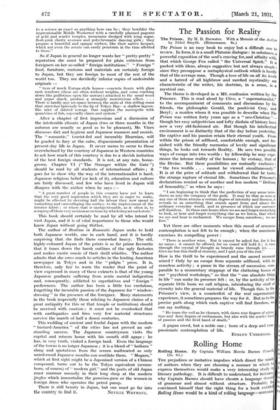The Passion for Reality
The Prison. By H. B. Brewster. With a Memoir of the Auttor The Prison is an easy book to enjoy but a difficult one to review. In form, it is a small Platonic dialogue : in substance, a powerful exposition of the soul's craving for, and affinity with, that which George Fox called." the Universal Spirit." It is packed with ideas, always suggestive but not always simple ; since they presuppose a metaphysical outlook which is hardly that of the average man. Though a love of life on all its levels and a hatred of all highbrow and rarefied mysticality are characteristic of the writer, his doctrine, in a sense, is a mystical one.
The theme is developed in a MS. confession written by the Prisoner. This is read aloud by Clive, a " supernaturalist," to the accompaniment of comments and discussions by his friends, the philosophic Gerald, the positivist Croy, and Beryl ; a maiden whom it was possible to describe when The Prison was written forty years ago as a " neo-Christian "— though her easy subjectivism and lofty disdain of history have now va very old-fashioned air. - But though his intellectual environment is so distinctly that of the day before yesterday, the captive and his passion retain their eternal youth. From within the prison of selfhood, comfortable enough, and fur- nished with the friendly memories of lovely and significant things, he looks out towards Reality. He sees two possible ways of escape into two worlds : by fellowship he may expe- rience the intense reality of the human ; by ecstasy, that of the Divine. But these possibilities are mutually exclusive ; " the two worlds . . . cannot be viewed simultaneously." It is at the price of solitude and withdrawal that he tastes the strange rapture of eternal life. Sometimes the Prisoner's declarations remind us of another and less modern " Defence of Sensuality," as when he says : " I am beginning to think that the perfection of any sense intro- duces us into the company of the gods. It may be that as soon as any one of them attains a certain degree of intensity and fineness, it reveals to us something that stands apart from and above the ordinary everyday world, and in presence of which our narrower self dissolves. In those rare hours when we see and forget everything to look, or hear and forget everything else as we listen, that which we see and hear is enchanted. We escape front ourselves ; we are free."
Yet there are other moments when this mood of sensuous contemplation is not felt to be enough ; when the numinous exercises its compelling power
" There is another wine. But it cannot be asked for, for it has no name ; it cannot be offered, for no vessel will hold it ; it runs through the crystal of thought as brandy runs through ice. . . Give me but this thrill of eternity, and I quit you of the rest."
How is the thrill to be experienced and the sacred moment seized ? Only by an escape from separate selfhood, with its ceaseless activity ; a pause in the stream of succession, com- parable to a momentary stoppage of the clattering looms of our " psychical workshops," so that the " one absolute thin in life " can make its presence felt ; or, by the activity of the separate little loom we call religion, introducing the stuff of eternity into the general material of life. Though this, in the Prisoner's view, is a counterfeit of the real supernatural experience, it sometimes prepares the way for it. But as to the precise path along which each captive will find freedom, we
can say nothing. r.
" He tears the veil as he chooses, with dawn rose fingers of adordr tion and fiery fingers of enthusiasm, but also with the scarlet head of passion and the livid hand of death."
A pagan creed, but a noble one ; born of a deep and cont.
passionate contemplation of life. it
EVELYN UNDERHILL.


















































 Previous page
Previous page